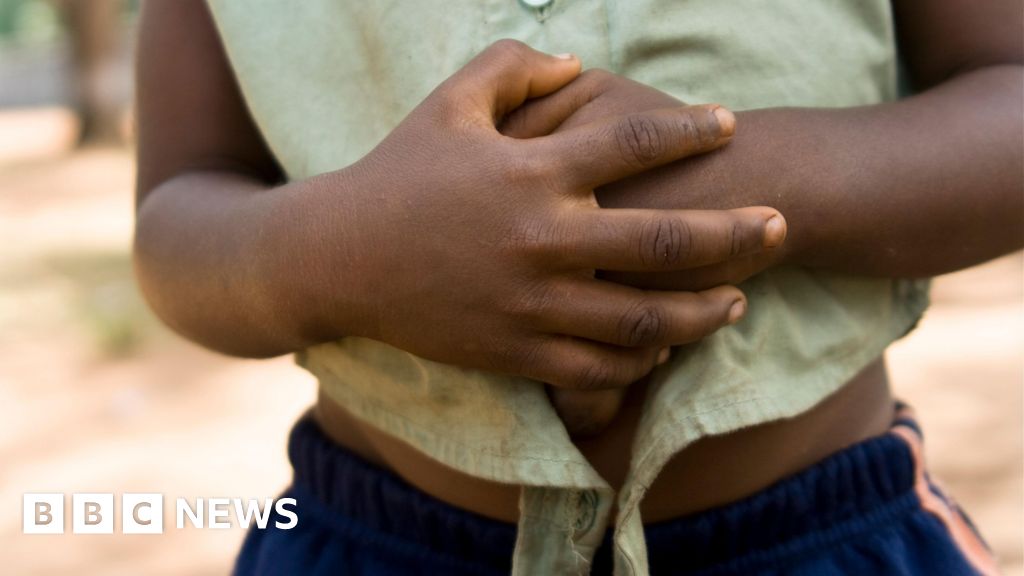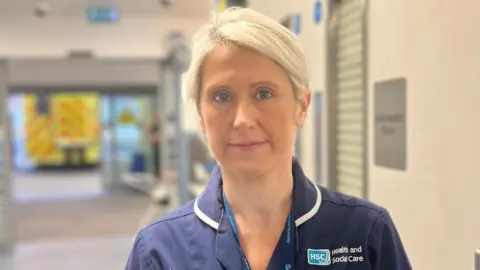 BBC
BBCTwo elderly patients have been in the emergency department (ED) of the Royal Victoria Hospital (RVH) in Belfast for more than five days, BBC News NI can reveal.
This comes after more than 500 patients were unable to be discharged from Northern Ireland’s hospitals on Sunday night, despite being medically fit.
With no suitable care for them in the community, it meant they remained in beds preventing other sick people from being admitted to hospital wards.
Lead nurse Claire Wilmont said that staff in the RVH were “treating the most vulnerable elderly sick patients in an intolerable environment”.
On Sunday, more than 400 people who attended emergency departments were told they would have at least a 12-hour wait for a hospital bed.
The Department of Health said longer-term solutions required sustained investment and reform.
Staff ‘really struggling’
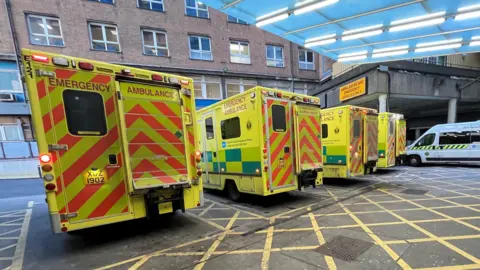
At the RVH on Monday, BBC News NI heard one person with flu was being treated in a unused tea room.
Three others have been in the same area for four days.
“We are dealing with the really elderly, vulnerable and really sick patients at the minute and due to the rising level of flu, we are really struggling to look after people,” Ms Wilmont said.
She explained that staff were stretched on a daily basis.
“The staff are trying their best, but there are delays and the care at times can be very challenging,” she added.
With the current cold snap and flu figures yet to peak in Northern Ireland the health service is bracing itself for a difficult week.
Some of those working over the weekend told BBC News NI that the longer wait was a concern – as delays increase the likelihood that some patients will come to harm.
One ED consultant said it was disgraceful that corridor care in emergency medicine had become “almost normalised”.
Another said that until social care was addressed in Northern Ireland, the predictable Christmas spike would not change.
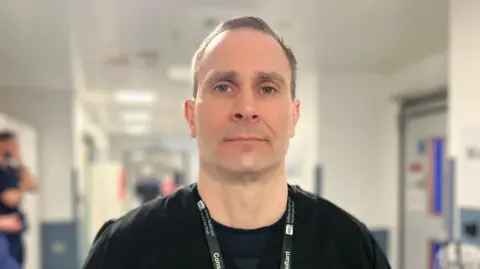
Acute medical consultant Dr Ian Carl explained that hospital flow was a major issue.
“Our acute sites are inferably at capacity in fact beyond capacity, it currently exists at 140% capacity but most days we run at 120% capacity,” Dr Carl said.
He added that patients who are fit to be home, but remain in a hospital environment, hold up beds for those waiting in emergency departments.
“We have patients who need care packages, patients that need to go to a care bed in a nursing or residential home, and also people who need permanent residence. It’s a massive problem we face,” he said.
‘Worst we’ve ever been’
The vice chair of the Royal College of Emergency Medicine in Northern Ireland has said it is “impossible to manage” the number of patients arriving to emergency departments.
A 12-hour wait for a bed was probably “a conservative estimate”, he said.
“Every department in this country will tell you there’s been patients waiting for three or four days,” he added.
“We are at the worst we’ve ever been, regarding the headlines today, to emergency medical staff, we knew this was going to happen, it hasn’t surprised us because this has been the trend for so long.
“There’s just no physical space to bring people in to get them assessed.”
Army support?
Health unions have told BBC News NI that while the flu spike was widely predicted, little was done on the ground to address the inevitable.
Among the possible scenarios being discussed by staff was to bring in the Army during December and January for additional support on the wards and in ambulatory care.
It was also suggested the health regulator, the RQIA, should be more flexible about rules in nursing homes, which require residents being sent to EDs rather than being cared for within the home.
To help reduce the spread of infection including flu, several hospitals in England have restricted hospital visits and have asked patients and visitors to wear face masks to prevent further spread of flu.
The freezing conditions will put the system under further pressure with calls for the public to be cautious and perhaps think twice about venturing out.
 Getty Images
Getty ImagesFigures seen by BBC News NI show that on Sunday evening the number of people waiting more than 12 hours were:
- 61 at Craigavon Area Hospital
- 51 at Antrim Area Hospital
- 49 at the Royal Victoria Hospital
- 48 at the Ulster Hospital
- 42 at Altnagelvin Hospital
- 35 at Causeway Hospital
- 24 at Daisy Hill Hospital
- 21 at the Mater Infirmorum Hospital
- 19 at the South Western Acute Hospital
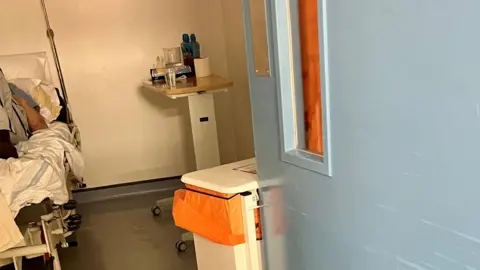
Longer-term solutions require sustained investment and reform, according to the Department of Health.
A spokesperson said demand for care was currently more than what the health service could provide.
The statement added that in recent days, the health minister had met emergency department staff, and had held discussions with both the Royal College of Nursing and the Royal College of Emergency Medicine.
“The minister shares their serious concerns about the impact of the immense pressures on staff and patients and will follow up with further engagement in the coming weeks,” the spokesperson said.
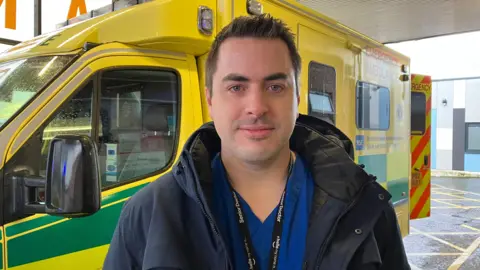
Emergency medicine consultant at Altnagelvin Hospital in Londonderry, Dr Ian Dunwoody, said they had seen a “record number” of attendances and people waiting to be admitted there over the last few weeks.
“Previously, 30 people would be a lot but now we are seeing 40 or 50 every day and we have had up to 75 people waiting during the last month,” he said.
“We only have 26 cubicle spaces in our emergency department so having 60 or 70 extra people waiting to go to the wards means we are very short of space, so that means a lot of people waiting in hallways and chairs and that is far from the level of care we want to be providing.”
Stormont emergency meeting
Stormont’s health committee will hold an emergency meeting on Tuesday. Health Minister Mike Nesbitt will be present to update members on emergency department waiting times.
“Figures from New Year’s Eve showed that more than half of the 892 people who attended EDs had to endure a wait of more than 12 hours, with almost 400 people waiting for a hospital bed last week,” committee chair Liz Kimmins said.
The Sinn Féin MLA added: “The rapid decline in care packages delivered over the winter period is also impacting on waiting lists and families who are badly in need of support to help take care of their loved ones.”
Committee member Colin McGrath said the executive must take responsibility for the current crisis.
McGrath said the executive and health minister had “ignored repeated warnings” from within the health service.
“The health minister’s own winter preparedness plan didn’t even arrive until November and was decried by many as ‘too little, too late’,” the SDLP MLA added.
 Getty
GettySome medical professionals, like Dr Joanne McClean, believe a drop in vaccine uptake has fuelled the surge in respiratory infections.
The Public Health Agency (PHA) said it was not too late for people to get the flu vaccine as cases had yet to peak, and it would protect the public and the health service well beyond the winter months.
“We’re in the middle of our winter virus season,” Dr Joanne McClean told BBC’s Good Morning Ulster programme.
“All during the year our hospitals and ED’s are really busy, and during winter, on-top of the usual pressures, we get winter viruses, mainly Covid, flu and RSV (respiratory syncytial virus).”
“We need to have our flu vaccine updated every year because flu changes every year.”
Source link
 Insights Daily World is your one-stop destination for discovering unbeatable discounts, trending deals, and the latest offers across various products. Stay informed with the newest updates, breaking news, and insightful deals, all designed to help you save and stay ahead
Insights Daily World is your one-stop destination for discovering unbeatable discounts, trending deals, and the latest offers across various products. Stay informed with the newest updates, breaking news, and insightful deals, all designed to help you save and stay ahead


